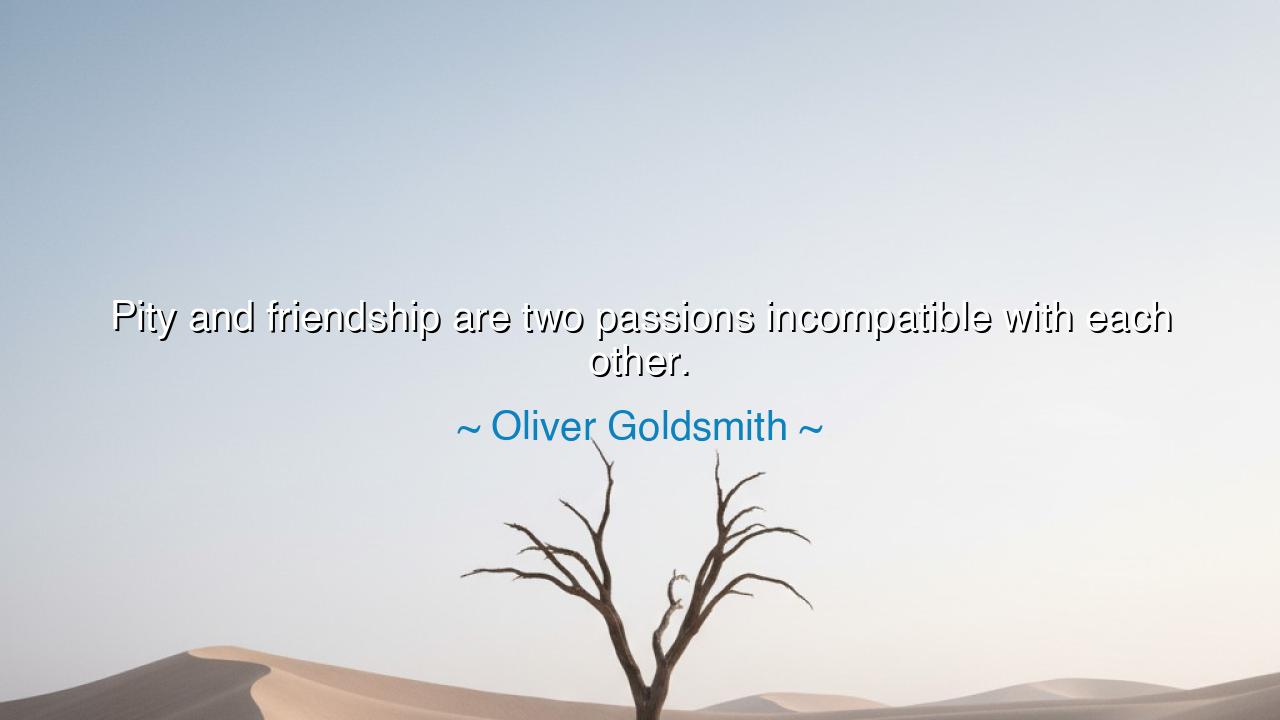
Pity and friendship are two passions incompatible with each






In the words of Oliver Goldsmith, a keen observer of the human soul, we are given a truth that strikes like quiet lightning: “Pity and friendship are two passions incompatible with each other.” At first, this saying feels cold, perhaps even cruel — for who among us has not pitied a friend, or been comforted by pity ourselves? Yet Goldsmith, writing from the wisdom of experience, reveals a deeper truth: that true friendship cannot survive the shadow of pity, for friendship demands equality of spirit, while pity rests upon inequality — one above, one below. In pity, there is distance; in friendship, there is balance. The two cannot share the same fire.
To the ancients, friendship was sacred — a bond of mutual respect, forged not in condescension but in communion. Aristotle himself taught that friendship arises only between equals in virtue, for affection between the greater and the lesser is never whole. Pity, by its nature, divides. It looks downward, not across. It says, “You are weaker than I,” even when the heart intends kindness. Thus, when Goldsmith declares them incompatible, he does not condemn compassion, but warns that compassion without respect poisons friendship. One who pities cannot fully admire; one who is pitied cannot feel fully free. And where equality dies, friendship decays.
Consider the story of King David and Jonathan, from the days of Israel’s ancient kings. Their bond was not one of pity but of shared honor — though David was a shepherd and Jonathan a prince, they met as equals in spirit. Jonathan did not look upon David with condescension but with reverence, recognizing in him the courage and faith that mirrored his own. Had pity crept between them — had Jonathan seen only a poor boy needing favor — their friendship would have been hollow, a shadow of charity rather than the light of brotherhood. But because they saw one another as equals, even when power, wealth, and danger tore at their lives, their bond remained unbroken. Thus, the story endures as a testament to friendship untainted by pity.
Yet Goldsmith’s insight is not only for kings and heroes. It speaks to every soul that has loved another human being. When one friend begins to see the other as a creature to be saved, not as a companion to be respected, the bond shifts from friendship to guardianship — and with that shift, love cools into duty. Pity robs friendship of its dignity, for it replaces shared strength with one-sided aid. To help a friend in need is noble, but to see that friend forever as needy is to chain them beneath your mercy. The wise, therefore, help without diminishing, and lift others up without reminding them of the fall.
The origin of Goldsmith’s thought may be traced to his own life of hardship and observation. A poet, novelist, and wanderer, he knew both poverty and patronage. He was often helped by those who pitied him — men of means who saw his talent as something to be fed rather than honored. Though grateful, he must have felt the sting of standing always as the lesser, his gratitude mistaken for loyalty. From such experience grew his understanding: that pity, though born of kindness, can turn affection into servitude, and equality into dependence.
To pity is human; to honor is divine. The wise heart learns to see suffering without placing itself above the sufferer. It offers help, but not from a throne — rather from beside, as one traveler steadying another on the same road. When we meet others as equals, even in their weakness, we grant them the dignity that keeps friendship pure. For it is not the act of giving that matters most, but the spirit in which it is done.
And so, let this be the lesson: if you would be a true friend, replace pity with respect, and compassion with companionship. Lift others not by lowering yourself into sorrow, but by reminding them of their strength. When you give, do not give from above, but from beside. Seek relationships where mutual admiration, not mercy, binds your hearts. For pity may comfort the moment, but friendship sustains the soul.
Thus, dear listener, remember Goldsmith’s warning. Let not your love become a chain of condescension. Be kind, but be equal. Be compassionate, but not patronizing. In this balance lies the highest form of friendship — one where two souls walk side by side, unburdened by superiority, joined not by need, but by mutual grace.






AAdministratorAdministrator
Welcome, honored guests. Please leave a comment, we will respond soon